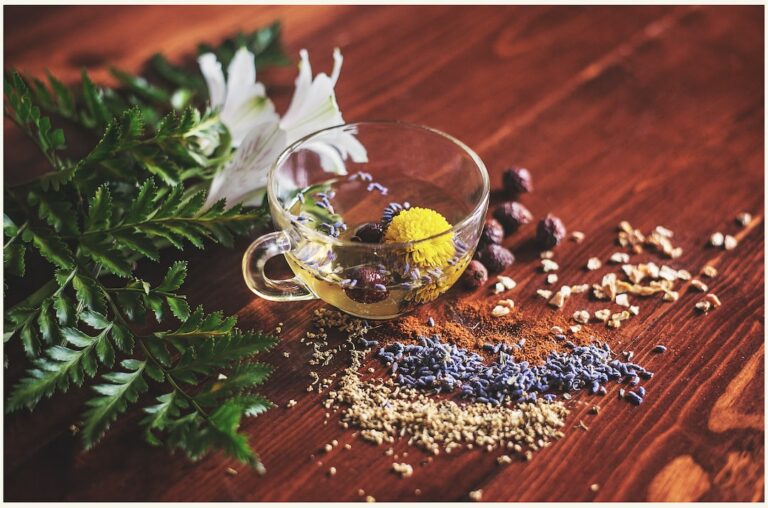Introduction
What are herbs?
Herbs are plants that have been used for centuries for their medicinal properties. They contain various compounds that can have a positive impact on our health. These natural remedies can be found in different forms such as leaves, flowers, seeds, or roots. Many cultures around the world have recognized the healing power of herbs and have incorporated them into their traditional medicine practices. They are known for their ability to treat a wide range of ailments, including digestive issues, respiratory problems, and skin conditions. Some popular herbs include chamomile, ginger, lavender, and peppermint. These herbs have been extensively studied and have shown promising results in improving overall well-being. Incorporating herbs into our daily routine can provide a natural and effective way to support our health and wellness.
The historical use of herbs in medicine
The historical use of herbs in medicine dates back thousands of years. Before the development of modern medicine, herbs were the primary form of healthcare. Many ancient civilizations, such as the Egyptians, Greeks, and Chinese, relied on herbs for their medicinal properties. These plants were used to treat a wide range of ailments and were often considered to be a gift from the gods. Today, herbs continue to play a significant role in alternative medicine treatments. They are believed to have various health benefits and are used in the form of teas, tinctures, and supplements. The use of herbs as a natural remedy has gained popularity in recent years, as people seek alternative treatments for their health issues. With their long history and proven effectiveness, herbs truly are nature’s medicine.
The concept of herbs as God’s medicine
The concept of herbs as God’s medicine has been deeply rooted in various cultures and religions throughout history. Herbs are believed to possess healing properties that are divinely ordained, making them a powerful tool for maintaining health and well-being. In many traditions, herbs are considered gifts from God, given to humanity for the purpose of promoting physical and spiritual healing. These natural remedies are often mentioned in religious texts and have been used for centuries to treat a wide range of ailments. By harnessing the power of herbs, individuals can tap into the wisdom of God’s creation and experience the profound benefits of natural medicine.
Benefits of Herbs

Herbs for physical health
Herbs for physical health play a crucial role in maintaining overall well-being. One such herb is chamomile tea, known for its numerous health benefits. Chamomile tea is rich in antioxidants and has anti-inflammatory properties, making it an excellent choice for promoting relaxation and reducing stress. Additionally, chamomile tea has been shown to aid digestion, relieve menstrual cramps, and improve sleep quality. Incorporating chamomile tea into your daily routine can provide a natural and gentle way to support your physical health.
Herbs for mental health
Herbs for mental health play a significant role in promoting overall well-being and emotional balance. One such category of herbs is occult plants. These extraordinary plants possess unique properties that have been traditionally used for enhancing mental clarity, reducing stress, and promoting relaxation. Whether it’s the calming effects of chamomile or the mood-boosting properties of lavender, occult plants have been revered for their ability to support mental health. Incorporating these herbs into your daily routine can provide a natural and holistic approach to maintaining emotional well-being.
Herbs for spiritual health
Herbs for spiritual health can play a significant role in promoting overall well-being and balance. These natural remedies have been used for centuries to support the mind, body, and spirit. Incorporating herbs into your daily routine can help enhance your spiritual practices and promote a sense of inner peace and harmony. Whether you are seeking to deepen your meditation practice, connect with your intuition, or cultivate a sense of calm, there are several herbs that can assist you on your spiritual journey. By incorporating these herbs into your healthy ways to stay awake, you can nourish your soul and support your spiritual growth.
Popular Herbs

Aloe vera
Aloe vera, also known as the ‘plant of immortality’, is a succulent plant species that has been used for centuries for its medicinal properties. It is native to the Arabian Peninsula but is now cultivated worldwide. Aloe vera contains a gel-like substance that is rich in vitamins, minerals, and antioxidants. This gel is commonly used topically to soothe and heal various skin conditions, including burns, wounds, and sunburns. Additionally, aloe vera gel can be consumed internally to promote digestive health and boost the immune system. However, it is important to note that there are potential risks associated with drinking chamomile tea. Some individuals may experience allergic reactions or interact with certain medications. It is always advisable to consult with a healthcare professional before incorporating aloe vera or any herbal remedy into your daily routine.
Turmeric
Turmeric is a powerful herb that has been used for centuries in natural medicine. It is known for its numerous health benefits and is often referred to as the ‘golden spice’. Turmeric contains a compound called curcumin, which has strong anti-inflammatory and antioxidant properties. This makes it effective in treating various health conditions, such as arthritis, heart disease, and even cancer. Additionally, turmeric has been found to improve digestion, boost the immune system, and support brain health. With its vibrant yellow color and distinct flavor, turmeric is a versatile ingredient that can be used in cooking, as a supplement, or even topically for skincare. Incorporating turmeric into your daily routine can help promote overall well-being and harness the power of natural medicine.
Ginger
Ginger is a powerful herb that has been used for centuries for its medicinal properties. It is known for its strong aromatic and spicy flavor, which comes from its natural oils. Ginger is widely recognized for its anti-inflammatory and antioxidant properties, making it a popular natural remedy for various health conditions. One of the most notable benefits of ginger is its ability to act as a natural antibiotic. Studies have shown that ginger contains compounds that have antimicrobial properties, making it effective against certain types of bacteria and viruses. Its antibacterial properties make ginger a valuable herb for boosting the immune system and fighting off infections. In addition to its antibacterial effects, ginger also has anti-inflammatory properties that can help reduce inflammation in the body. Overall, ginger is a versatile herb that can be used to promote overall health and well-being.
How to Use Herbs

Herbal teas
Herbal teas are a popular and natural way to enjoy the benefits of herbs. These teas are made by infusing dried herbs in hot water, allowing their medicinal properties to be released. Herbal teas have been used for centuries to treat various health conditions and promote overall well-being. They can be enjoyed hot or cold, and each herb has its own unique flavor and health benefits. Some popular herbal teas include chamomile, peppermint, and ginger. Drinking herbal teas regularly can help support the immune system, aid digestion, and reduce stress. Incorporating herbal teas into your daily routine is a simple and effective way to harness the healing power of herbs.
Herbal supplements
Herbal supplements have gained popularity as a natural alternative to Western medicine. These supplements are derived from various plants and herbs, which have been used for centuries to promote health and well-being. The use of herbal supplements has been a part of traditional medicine practices in many cultures around the world. They are believed to have numerous health benefits and can be used to support various aspects of the body’s functioning. Western medicine, on the other hand, focuses on pharmaceutical drugs and surgical interventions. While Western medicine has made significant advancements in treating and managing diseases, herbal supplements offer a holistic approach that considers the body as a whole. By incorporating herbal supplements into your daily routine, you can enhance your overall well-being and support your body’s natural healing processes.
Herbal remedies
Herbal remedies have been used for centuries as natural alternatives to conventional medicine. These remedies have gained popularity in recent years due to their effectiveness and minimal side effects. Integrative medicine, which combines traditional and holistic approaches, recognizes the power of herbs as God’s medicine. Integrative medicine practitioners believe that herbs can support the body’s natural healing processes and promote overall well-being. By incorporating herbal remedies into their treatment plans, individuals can experience the benefits of both modern science and ancient wisdom.
Precautions and Side Effects

Interactions with medications
Interactions with medications are an important consideration when using herbs as a form of medicine. It is crucial to be aware of how herbs may interact with any medications you are currently taking. Some herbs can enhance the effects of certain medications, while others may interfere with their absorption or metabolism. It is always recommended to consult with a healthcare professional or a qualified herbalist before incorporating herbs into your healthcare routine, especially if you are taking any prescription medications. By being informed about potential interactions, you can ensure the safe and effective use of herbs as a complementary medicine.
Allergic reactions
Allergic reactions to herbs can vary widely, depending on the individual and the specific herb. Some people may experience mild symptoms such as itching or a rash, while others may have more severe reactions like difficulty breathing or swelling. It is important to be aware of any potential allergies before using herbs as medicine. If you experience any adverse reactions, it is recommended to discontinue use and consult a healthcare professional. Common herbs that may cause allergic reactions include chamomile, echinacea, and St. John’s wort.
Overdose and toxicity
Overdose and toxicity
FAQ (Frequently Asked Questions)

Are herbs safe for everyone?
Are herbs safe for everyone?
When it comes to seeking help for addiction, herbs can be a valuable tool in the journey towards recovery. While it is important to note that herbs alone cannot cure addiction, they can complement traditional treatment methods and support the healing process. Herbs such as St. John’s Wort, Kava, and Valerian root have been used for centuries to promote relaxation, reduce anxiety, and improve sleep. These natural remedies can provide a sense of calm and tranquility, which can be beneficial for individuals struggling with addiction. However, it is crucial to consult with a healthcare professional before incorporating herbs into your treatment plan, as they may interact with medications or have contraindications for certain medical conditions. By working closely with a healthcare provider, you can ensure that herbs are used safely and effectively in your journey towards recovery.
Can herbs cure serious illnesses?
Can herbs cure serious illnesses? Many people believe that herbs have the power to cure serious illnesses. While herbs can provide relief for certain ailments, it is important to note that they are not a substitute for professional medical treatment. However, herbs can be used as natural remedies for anxiety. These natural remedies have been found to help reduce symptoms of anxiety and promote a sense of calm. If you are experiencing anxiety, it may be worth exploring the use of herbs as a complementary treatment option. Some popular herbs for anxiety include chamomile, lavender, and valerian root. These herbs can be consumed in the form of teas, tinctures, or supplements. It is important to consult with a healthcare professional before incorporating herbs into your treatment plan, especially if you are taking any medications or have pre-existing medical conditions.
Where can I buy high-quality herbs?
When it comes to buying high-quality herbs, it is important to choose a reputable source. There are several options available for purchasing herbs, including local health food stores, online retailers, and herbalist shops. It is recommended to do some research and read reviews before making a purchase. Look for suppliers that prioritize organic and sustainable farming practices to ensure the herbs are of the highest quality. Additionally, consider purchasing from suppliers that offer a wide variety of herbs to choose from, as this indicates their expertise and commitment to providing a diverse selection. By buying high-quality herbs, you can ensure that you are getting the most potent and effective medicine nature has to offer.






























